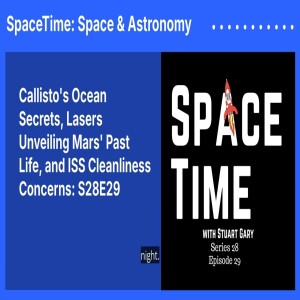
Friday Mar 07, 2025
Callisto’s Ocean Secrets, Lasers Unveiling Mars’ Past Life, and ISS Cleanliness Concerns: S28E29
SpaceTime Series 28 Episode 29
The Astronomy, Space and Science News Podcast
Exploring Callisto's Ocean Potential, Laser Fossil Detection on Mars, and ISS Cleanliness Concerns
In this episode of SpaceTime, we dive into exciting new research suggesting that Jupiter's moon Callisto may harbor a subsurface ocean, potentially making it another ocean world in our solar system. This revelation builds on data from NASA's Galileo spacecraft, which hinted at the presence of a salty liquid water ocean beneath Callisto's icy crust. Advanced modeling techniques have strengthened these claims, setting the stage for further exploration by NASA's Europa Clipper and ESA's Juice missions.
Lasers on Mars: Searching for Ancient Life
We also discuss innovative research that proposes using lasers to identify ancient microbial fossils on Mars. Scientists have successfully detected microbial fossils in gypsum on Earth, raising hopes that similar techniques could uncover evidence of past life on the Red Planet. The findings suggest that gypsum deposits on Mars could conceal traces of ancient life, preserved in mineral formations that formed when water evaporated billions of years ago.
Health Implications of Sterility on the ISS
Additionally, we explore a new study indicating that the overly sterile environment of the International Space Station may be negatively impacting astronaut health. The research suggests that introducing a diverse range of microbes could potentially alleviate immune dysfunction and other health issues experienced by crew members during long missions in space.
00:00 Space Time Series 28 Episode 29 for broadcast on 7 March 2025
00:49 New findings on Callisto's potential subsurface ocean
06:30 Implications for future missions to Jupiter's moons
12:15 Using lasers to detect ancient life on Mars
18:00 Analysis of gypsum deposits and their significance
22:45 Concerns regarding ISS cleanliness and astronaut health
27:00 Overview of March's night sky and celestial events
30:15 Celebrating PI Day and its significance in astronomy
www.spacetimewithstuartgary.com (https://www.spacetimewithstuartgary.com/)
www.bitesz.com (https://www.bitesz.com/)
🌏 Get Our Exclusive NordVPN deal here ➼ www.bitesz.com/nordvpn (https://www.bitesz.com/nordvpn) . Enjoy incredible discounts and bonuses! Plus, it’s risk-free with Nord’s 30-day money-back guarantee! ✌
Check out our newest sponsor - Old Glory - Iconic Music and Sports Merch and now with official NASA merchandise. (https://www.bitesz.com/oldglory) Well worth checking out...
Become a supporter of this Podcast for as little as $3 per month and access commercial-free episodes plus bonuses: https://www.spacetimewithstuartgary.com/about (https://www.spacetimewithstuartgary.com/about)
✍️ Episode References
NASA
https://www.nasa.gov (https://www.nasa.gov/)
AGU Advances
https://agupubs.onlinelibrary.wiley.com/journal/23335784 (https://agupubs.onlinelibrary.wiley.com/journal/23335784)
Cell
https://www.cell.com/ (https://www.cell.com/)
Frontiers in Astronomy and Space Sciences
https://www.frontiersin.org/journals/astronomy-and-space-sciences (https://www.frontiersin.org/journals/astronomy-and-space-sciences)
Become a supporter of this podcast: https://www.spreaker.com/podcast/spacetime-space-astronomy--2458531/support (https://www.spreaker.com/podcast/spacetime-space-astronomy--2458531/support?utm_source=rss&utm_medium=rss&utm_campaign=rss) .
Episode link: https://play.headliner.app/episode/25944354?utm_source=youtube
No comments yet. Be the first to say something!